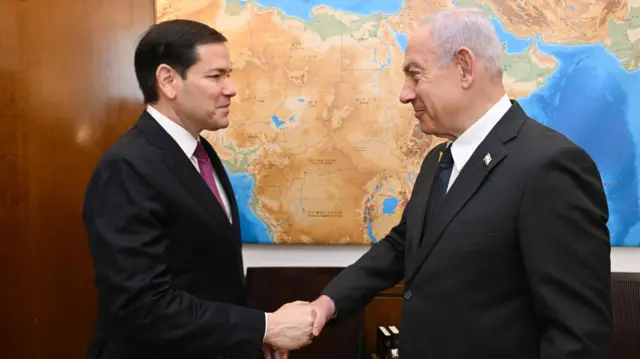Israeli Prime Minister Benjamin Netanyahu has refused to rule out future operations against Hamas leaders outside Palestinian territories, days after a strike in Qatar triggered strong global criticism.
Speaking alongside US Secretary of State Marco Rubio in Jerusalem, Netanyahu declared that Israel’s leadership “will not have immunity wherever they are,” insisting that nations have the right to defend themselves even beyond their borders.
The rare targeting of Hamas officials in Qatar — a key American ally — sparked backlash, including condemnation from US President Donald Trump.
Hamas reported six casualties in the attack but confirmed its top leadership escaped.
The operation has placed Washington in a delicate position, with the White House earlier stressing Trump’s assurance to Qatar “that such a thing will not happen again on their soil.”
Pressed on whether the US had supported the strike, Netanyahu dismissed the speculation, telling reporters: “We did it on our own. Period.”
Rubio, asked if the move had damaged US standing in the region, responded that Washington continued to enjoy “strong relationships with our Gulf allies.”
Both men sought to project unity, with Rubio highlighting shared cultural and technological cooperation, while Netanyahu praised America as Israel’s “best ally.”
The meeting unfolded as Arab leaders convened in support of Qatar.
The Qatari prime minister accused Israel of double standards and urged international action against its actions. When asked later if Israel had guaranteed restraint, Trump twice stated that Netanyahu “won’t be hitting Qatar.”
Qatar, which hosts a major US airbase, has acted as a mediator in indirect negotiations between Hamas and Israel since 2012, also housing the group’s political bureau. According to a US State Department official, Rubio will head to Doha after his Israel stop.
On Sunday, Netanyahu stressed that ties with Washington were as “durable as the stones in the Western Wall” after he and Rubio visited the Old City of Jerusalem.
They were joined by US ambassador Mike Huckabee, with Rubio taking part in the traditional act of placing a note inside the Wall. Questions on Israel’s actions in Qatar went unanswered.
Reports suggest the two leaders also reviewed Israel’s battlefield plans in Gaza City and the government’s settlement push in the West Bank.
Over the weekend, the Israeli military demolished several residential blocks in Gaza and signaled readiness for ground operations in the city’s western districts.
Residents have been ordered south, with the Israel Defense Forces estimating that 250,000 have already fled. Yet hundreds of thousands remain trapped, citing danger in the south and lack of money or shelter.
“They are asking us to leave our homes, as if they’re asking us to go on a trip,” said Gaza City resident Hafez Habous. “Here in Gaza we will die for one reason: we simply have no money. We have no tents, no makeshift shelters, and transport is unavailable.”
He explained that drivers demanded 300 shekels — about $90 — to move south, a price far beyond the reach of most families.
The UN has warned that escalating the assault in Gaza City, where famine has already been declared, would drive civilians into “an even deeper catastrophe.”
The Netanyahu-Rubio talks come ahead of a UN General Assembly session next week where countries such as the UK, France, Canada, Australia and Belgium are expected to formally recognise a Palestinian state.
The prospect has reignited disputes within Israel’s government, with hardliners pushing for annexation to block Palestinian statehood.
Last month, Israel gave final approval for the controversial E1 settlement east of Jerusalem, which would effectively sever the West Bank into two. Netanyahu, signing the agreement, declared: “We are going to fulfil our promise that there will be no Palestinian state. This place belongs to us.” Far-right Finance Minister Bezalel Smotrich has separately outlined plans to annex nearly four-fifths of the territory.
Since 1967, Israel has constructed around 160 settlements in the West Bank and East Jerusalem, now home to about 700,000 Israelis alongside more than 3.3 million Palestinians. The settlements are considered illegal under international law.
Later Monday, Rubio is expected to tour the City of David archaeological park in East Jerusalem, including the controversial “Pilgrimage Road” excavation under Palestinian homes in Silwan. Critics argue the project is being used to politicise archaeology while displacing local residents.

